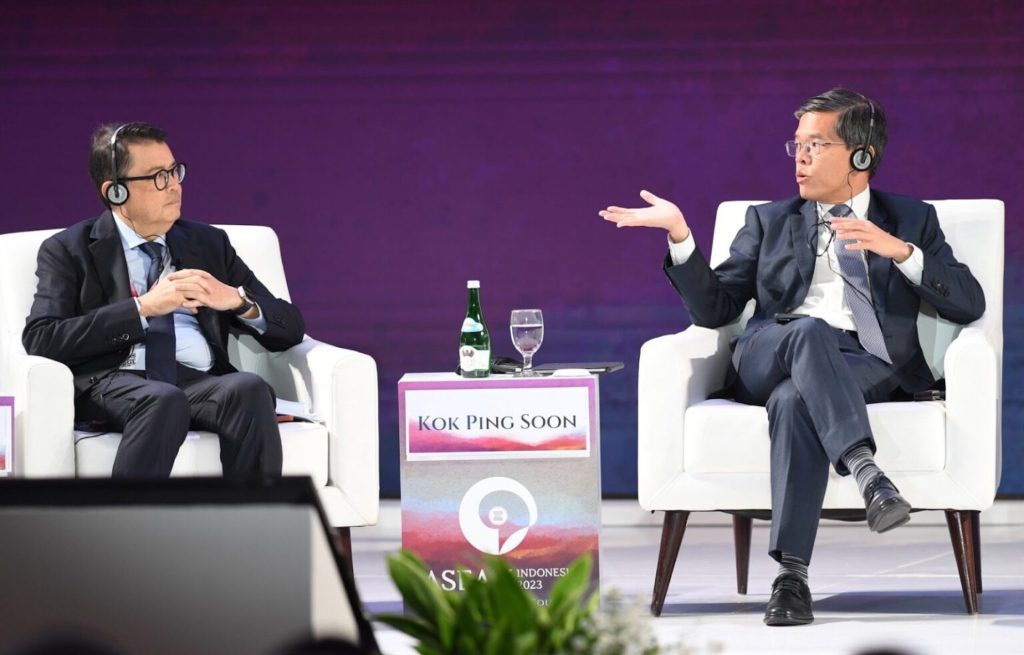
Digital Transformation Event for MSMES
September 25, 2023
Concepcion Counters Downtrends, Stays Optimistic on PH Economy
September 28, 2023
Prosperity in the Coming Age of Asean
It has been three weeks and I am still brimming with adrenaline from the success of the ASEAN Business and Investment Summit (ABIS). This is the annual event that is the high point of the ASEAN Business Advisory Council (BAC)’s calendar. Though an entirely private sector-initiated event, it enjoys government support and is held alongside the ASEAN Leaders Summit and draws the top of the lot in government and business.
The ASEAN BIS is usually hosted by the year’s ASEAN BAC chair and this year, that honor went to Indonesia. The host country did an excellent job of organizing this year’s ABIS. On top of organizing the event, they were able to put together several other dedicated forums. As pointed out by ASEAN BAC Malaysia chair Nazir Razak, it was so well executed that it left him feeling re-energized and enthusiastic about ASEAN integration. I couldn’t agree more.
Credit must go to ASEAN BAC Indonesia’s team and most especially its chair, M. Arshad Rasjid. He is also the CEO of Indika Energy and undoubtedly one of Indonesia’s most prominent businessmen. He was in Manila last February as part of a roadshow to all ASEAN member- and partner-states, all in preparation for this September’s summit and in aid of finetuning ASEAN BAC Indonesia’s legacy project. He was so intent on immersing himself in ASEAN BAC Philippines’ priority projects that he and his team even volunteered to mentor at our free entrepreneurship mentoring event at the Robinsons Galeria during their visit.
Now I must explain that each time a country becomes chair of the ASEAN BAC, that country must leave behind a legacy project that it will continually work on beyond the end of its chairmanship. A legacy project encapsulates the priorities of that particular country, and the project must be in the context of achieving the ASEAN BAC’s mission of providing private sector guidance and feedback to governments in order to boost the region’s efforts toward economic integration. Indonesia overdelivered and launched not just one, but four legacy projects: the ASEAN single QR code, ASEAN Net Zero Hub, ASEAN Wikipreneur and ASEAN Business Entity.
Indeed, it is quite clear that Indonesia will be a tough act to follow. Next year will be Laos’ turn, and after that will be Malaysia. The Philippines will be ASEAN BAC chair in 2026. But the way I see it, Indonesia’s outstanding job at this year’s chairmanship is not a challenge to outdo and outperform, but an opportunity to build on.
In a team, we stand on the shoulders of our teammates so we can reach higher than we could ever have had we gone it alone. Each chairmanship of the ASEAN BAC can build on the previous years’ legacies. With AMEN now already with graduates from all ten member-states, Indonesia has at its disposal a wealth of input for its Wiki Entrepreneur program.
The Philippines, on the other hand, can build on what has been learned from Indonesia’s Inclusive Closed Loop in agriculture, and set the stage for the Kapatid Angat Lahat sa Agri Program (KALAP).
It is indeed quite serendipitous that KALAP looks to be our legacy project for 2026, and that we have already started work on it even before our chairmanship year. By the time 2026 comes around, we would have already had a solid proof of concept for KALAP; one that could become the jumping point to scale throughout ASEAN and sustain true ASEAN economic integration.
There is so much optimism in the future of the ASEAN. It seems the time is right because, as Nazir correctly observed, there has never been a time when every ASEAN country could boast certainty in political leadership. Thailand successfully resolved its deadlock over the Prime Ministership, marking a significant breakthrough. In Cambodia, a historic transition of power took place as its Prime Ministership smoothly changed hands after nearly four decades. I have met the new Cambodian PM, Hun Manet, a highly educated West Pointer who is also a trained economist, and I am confident he is well-equipped to lead his country in a fast-rising ASEAN.
Furthermore, the recent state elections in Malaysia served as a strong testament to the stability and strength of the unity government. The sustained popularity of Joko Widodo in Indonesia bodes well for a smooth transition to whoever he will choose to anoint as his possible successor, and in the Philippines, President Ferdinand Marcos Jr. is still enjoying support after winning a historic majority in the 2022 elections.
The digital economy will be brisk in ASEAN, as projected by several prominent think tanks. Its relatively young population is expected to peak several years from now, which gives it a significant advantage, given the graying population of many developed countries elsewhere in the world. Foreign direct investments hit a record high in 2022, with more room to grow, given how recent international developments are favoring a more ASEAN-friendly global supply chain map.
The Regional Comprehensive Economic Partnership or RCEP, once it realizes its full potential, is set to become not just the world’s largest trade pact, but one that will be sustained in the years to come should the economists be proven right that ASEAN will be the fastest growing regional economy in the near future. If we stay the course and give the private sector the opportunity to contribute to driving and steering that growth, then we can look forward to finally realizing region-wide, inclusive prosperity here in ASEAN.

2/F RFM Corporate Center, Pioneer cor. Sheridan Sts. Mandaluyong City, Metro Manila, Philippines

